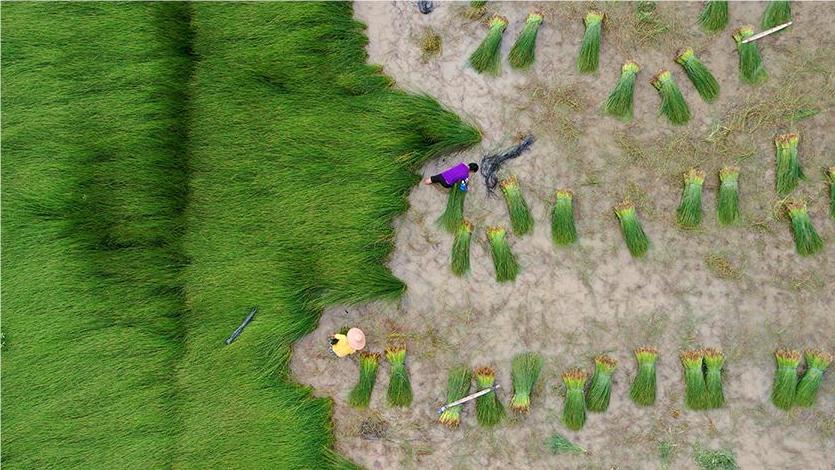Young people embrace CPC legacy for inspiration and strength
BEIJING, July 4 (Xinhua) -- "The stone tablet on my right marks farmland allocated to the Red Army. It bears testament to the deep bond between the army and the people," Wu Haoya told a tour group of over 40 people.
For the 29-year-old docent at a revolutionary museum in Jinzhai County, east China's Anhui Province, it is just another busy day, as she typically receives four or five tourist groups a day around July 1, the anniversary of the founding of the Communist Party of China (CPC).
Tucked in the Dabie Mountains, the county contributed tens of thousands people to the CPC-led revolution in the first half of the 20th century. A total of 12 main units of the Red Army originated from here.
As a docent, Wu boasts expert knowledge of over 2,400 artifacts with scripts and historical recordings totaling tens of thousands of Chinese characters. Despite the volume, she finds these materials neither obscure nor difficult.
"Some of the Communists sacrificed their lives at my age. Sharing their stories to inspire and influence others gives profound meaning to my job."
Behind her, Wang Chenbin, a 24-year-old volunteer docent, is taking notes to prepare for her first guided tour. Wang is among the museum's more than 50 volunteer docents aged at 40 and below, including primary school students and individuals with full-time jobs.
ENTHUSIASM FOR CPC LEGACY
In recent years, an increasing number of young people have been visiting revolutionary museums, memorials and martyrs' cemeteries to learn about the stories of early Communists.
Yang Xiaolu, curator of the revolutionary museum in Jinzhai, said that the 8,000-square-meter museum recorded more than 1 million visits in 2023, receiving the highest number of children and juvenile visitors among all museums in the province.
There are over 1,600 revolutionary museums and memorials as well as more than 300 CPC heritage tourism sites across China.
A 2023 tourism report said that Chinese people had paid over 2 billion visits to CPC heritage sites, contributing to a market worth nearly 1 trillion yuan (around 140 billion U.S. dollars). An analysis by China Mobile reveals that people aged between 31 and 40 were the largest visitor group to CPC heritage sites during the Qingming Festival holiday in April, accounting for 35 percent of all the visitors.
Experts attributed young people's growing passion for the CPC legacy to their strong sense of national pride and their perception of themselves as masters of the country, shaped by their upbringing in a period of rapid economic growth and increased national strength.
"Visiting CPC heritage sites, recounting CPC stories, and studying CPC literature are among the many ways they express their patriotism," said Wu Ruoshan, a contract research fellow at the Tourism Research Center under the Chinese Academy of Social Sciences.
Amid the burgeoning enthusiasm for CPC heritage tourism, a narrative unfolds -- one that charts the growing identification of China's youth toward the CPC. Singaporean newspaper Lianhe Zaobao observed that today's young Chinese proudly wear two badges: socialist spirit and professional prowess.
Statistics show that the Party's membership body has swelled annually with over 80 percent of newcomers aged 35 and below for the past decade. In 2023, 82.4 percent of new CPC members were aged 35 and below, with over half having completed junior college education or higher.
A DIGITAL TOUCH IN REVIVING CPC LEGACY
In the vibrant tapestry of modern China, young enthusiasts are also weaving a new thread -- the digital reinterpretation of CPC heritage. Through vlogs and online tours, they contribute to transforming historical sites into interactive experiences.
Wang Yixuan, a post-95 employee at a media center in Guazhou County in northwest China's Gansu Province, boasts a seemingly endless gallery of red-themed video clips on her smartphone.
This year, Wang teamed up with a dozen post-90s colleagues to scour dusty archives and trek historical grounds to release 58 polished short videos about revolutionary tales, amassing over 300,000 views in total.
These short videos have helped more people learn about early Communists and local revolutionary history, while also boosting tourism's economic benefits for locals, Wang said.
In response to the growing passion among the younger generation, revolutionary tourist sites are exploring innovative tourism forms and diverse red tourism products, bringing revolutionary culture closer to young audiences.
For example, in Yudu, Jiangxi Province, the starting point of the Red Army's epic Long March in the 1930s, the 12,500-km journey is vividly recounted through digitally-empowered performances, attracting numerous young people to experience history anew.
Photos
Related Stories
Copyright © 2024 People's Daily Online. All Rights Reserved.









